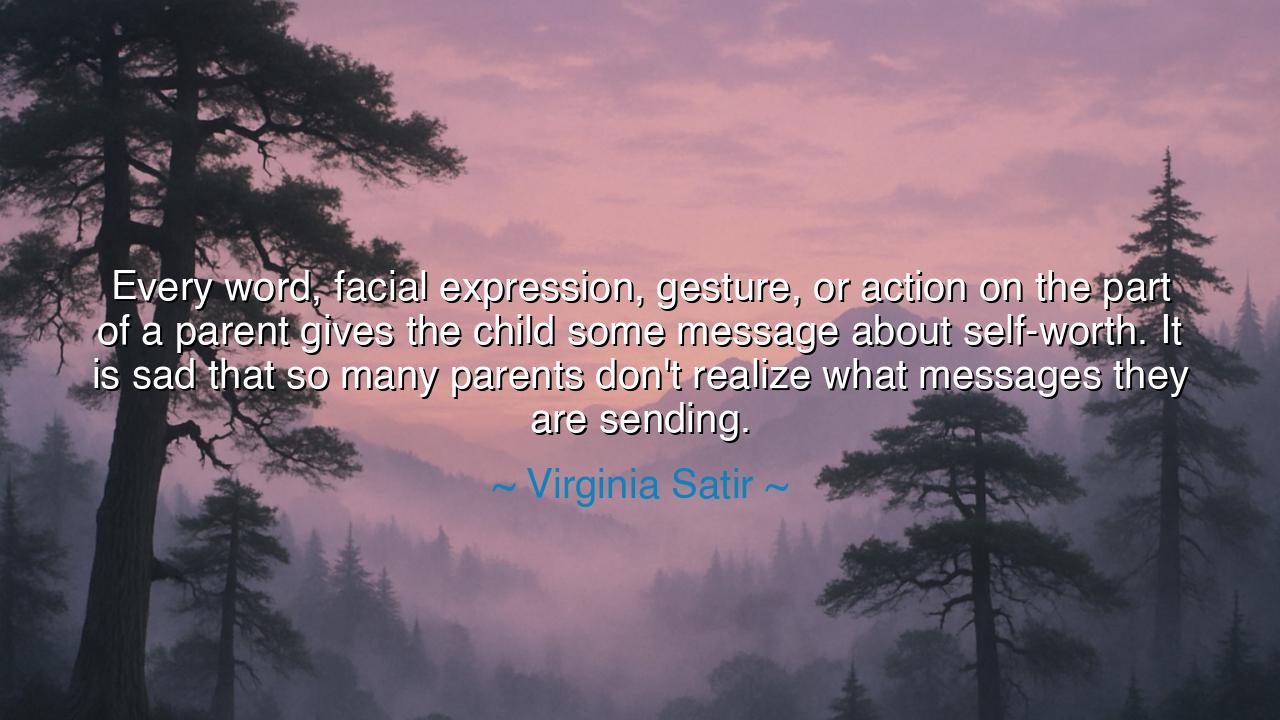
Every word, facial expression, gesture, or action on the part of
Every word, facial expression, gesture, or action on the part of a parent gives the child some message about self-worth. It is sad that so many parents don't realize what messages they are sending.






The words of Virginia Satir, “Every word, facial expression, gesture, or action on the part of a parent gives the child some message about self-worth. It is sad that so many parents don't realize what messages they are sending,” ring with the wisdom of one who understood the architecture of the human soul. In this single statement lies an entire philosophy of love, communication, and emotional inheritance. Satir, a pioneer in family therapy, reminds us that children do not grow only from food and shelter, but from the unseen nourishment of affection, affirmation, and presence. The home, in her eyes, is the first temple of the spirit — and every gesture within it is a prayer or a wound.
From the beginning of time, the parent has been the first mirror of the child’s identity. Before a child learns to read words, they learn to read faces. A smile tells them they are welcome in the world; a sigh of impatience teaches them they are a burden. A gentle hand builds confidence; a cold glance plants doubt. Satir’s insight carries the gravity of ancient truth — that the power of a parent’s presence can shape the fate of generations. Just as water takes the shape of its vessel, the soul of a child takes the shape of the messages it receives from those who hold its heart.
In the old world, teachers of wisdom often spoke of the “silent education” — the lessons taught not by words but by example. A father who treats his wife with gentleness teaches his son how to love; a mother who listens without judgment teaches her daughter how to trust. But the reverse is also true: neglect, anger, or mockery carve invisible scars that echo through a lifetime. A child who grows up under constant criticism learns not to live, but to apologize for existing. Satir’s sorrow — her “sadness” — comes from witnessing this tragedy repeated endlessly: parents who mean no harm, yet, through thoughtless habits, teach their children to doubt their own worth.
There is a story told of Michelangelo that mirrors this truth. When asked how he created the statue of David, he replied, “I saw the angel in the marble and carved until I set him free.” So too, the task of the parent is to see the angel in the child — the potential for greatness, kindness, and beauty — and carve away the fear and shame that obscure it. But unlike the sculptor’s marble, the child feels every stroke. Each word and gesture, gentle or harsh, becomes part of the sculpture’s final form. What Satir teaches is that parenting is not merely a role — it is a creative act, a sacred art of shaping human souls.
Self-worth is the foundation upon which every other virtue is built. A child who believes they are loved learns to love others; one who believes they matter learns to act with purpose. Without it, no achievement or wealth can bring peace. The ancients knew that the heart’s first trust — its faith in being wanted — is the root of all wisdom. If that trust is broken early, life becomes a long journey of trying to mend it. This is why Satir’s teaching carries both tenderness and warning: every home is a workshop of either healing or harm, depending on the awareness of those who dwell within it.
Even the smallest gestures — a nod, a tone, a silence — can alter the course of a child’s future. Consider the story of Thomas Edison, whose teacher once called him “too stupid to learn.” His mother, however, refused to accept this cruel label. She told her son that his teacher had said he was a genius, misunderstood by ordinary minds. That single act of belief gave him courage, and history was changed by her faith. Here we see Satir’s wisdom embodied: a parent’s message, even unspoken, becomes the soil in which destiny grows.
The lesson, then, is sacred and enduring: speak to your children as if the world depends on your words — because it does. Every expression, every reaction, carries the weight of creation. To raise a child is not to control them, but to awaken in them the knowledge that they are loved, seen, and worthy. The wise parent watches not only what they say, but what their eyes, hands, and silences declare. For in every home, a generation is being formed — and the messages we send today will echo in the hearts of tomorrow’s world.






AAdministratorAdministrator
Welcome, honored guests. Please leave a comment, we will respond soon